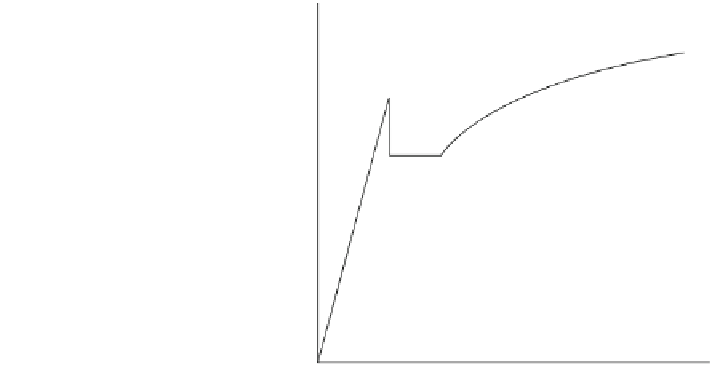Geology Reference
In-Depth Information
Fig. 6.9 A ''yield point'' in a
stress-strain curve
STRAIN
moving the dislocations. This situation gives rise to an overall resistance to
dislocation motion, known as solute or solid solution hardening when the point
defects are solute atoms. Theoretical studies suggest that the solute introduces a
strengthening proportional to c
2
;
at low concentration c,toc
3
;
at medium to
high concentration, with a proportionality constant that contains the interaction
force or ''obstacle strength'' with a power somewhat greater than unity (see
further
Sect. 6.6.3
).
2. If, however, solute segregation has occurred, either in the core or nearby, so as
to tend to pin or lock the dislocations in their initial positions but the test
temperature is too low for diffusion of the solute to occur at an appreciable rate,
then in order to initiate plastic deformation a relatively high stress is at first
needed, higher than the stress needed to maintain the dislocations in motion
once they are freed from their locking atmospheres. In this case, there is a
tendency for the stress to fall in the early stages of a stress-strain test, after
initiation of plastic deformation, an effect commonly referred to as a ''yield
point'' (Fig.
6.9
).
3. Alternatively, if the temperature is high enough that the segregating species can
keep pace with the dislocation movement by diffusion, then the interaction
between solute and dislocation leads to a viscous drag force on the dislocation.
This effect will tend to give rise to linear (Newtonian) viscous behavior in
which the velocity of the dislocation is proportional to the resolved shear stress
acting in the region of the crystal containing the dislocation. The constant of
proportionality will vary directly with the diffusion coefficient of the solute and
inversely with the mean solute concentration, as well as depending on the
interaction potential governing the distribution of the solute around the dislo-
cation. (See further,
Sects. 6.4.1
and
6.6.5
).

